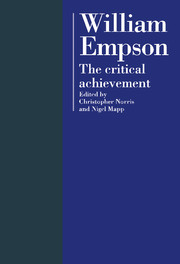Book contents
- Frontmatter
- Contents
- Contributors
- Foreword
- 1 Introduction: Empson as literary theorist: from Ambiguity to Complex Words and beyond
- 2 Empsonian honesty and the beginnings of individualism
- 3 Empson, Leavis, and the challenge of Milton
- 4 Empson's Satan: an ambiguous character of the seventh type
- 5 Compacted doctrines: Empson and the meanings of words
- 6 Figural narrative and plot construction: Empson on pastoral
- 7 More lurid figures: de Man reading Empson
- 8 Fool and pharmakon
- 9 William Empson's cosmicomics
- 10 Empson as teacher: the Sheffield years
- References
- Index
2 - Empsonian honesty and the beginnings of individualism
Published online by Cambridge University Press: 01 June 2011
- Frontmatter
- Contents
- Contributors
- Foreword
- 1 Introduction: Empson as literary theorist: from Ambiguity to Complex Words and beyond
- 2 Empsonian honesty and the beginnings of individualism
- 3 Empson, Leavis, and the challenge of Milton
- 4 Empson's Satan: an ambiguous character of the seventh type
- 5 Compacted doctrines: Empson and the meanings of words
- 6 Figural narrative and plot construction: Empson on pastoral
- 7 More lurid figures: de Man reading Empson
- 8 Fool and pharmakon
- 9 William Empson's cosmicomics
- 10 Empson as teacher: the Sheffield years
- References
- Index
Summary
A philosopher of ordinary language might pose the topic of this essay as follows: what sort of world is made of human agents expressing themselves through verbal acts like approving and disapproving of other people's behaviour, lyricizing in plain verse their feelings without necessarily achieving authenticity or intimacy and knowing how to talk so that you gain people's trust and confidence without necessarily telling the truth? Two crucial verbal acts are excluded from this world, however: no one may deny things and no one uses hyperbolical diction. To imagine this world is to become part of the verbal universe of William Empson. I put forward the effort to imagine this world of limited verbal gestures to get at a central issue in Empson's work: for all his overt emphasis on verbal behaviour, his complete lack of interest in formal, aesthetic and stylistic resources in language, is Empson's verbal universe rooted in genuine social perceptions? As my short list might indicate, what seems to be excluded from the realm of verbal activity is a high degree of expressive autonomy, intimate personal understanding and antinormative uses of language, as if these were impossibilities in face of the inherently social function of language. But Empson's faith in the socializing function of language runs into some serious problems. We posit values, question repressive conditions, affirm choices and legislate through verbal acts which rest on some principle of free agency, on the decision to pursue one course or another, and if any one of these acts results in harm, even violence, it may indicate the presence of a pseudo-social language that entraps and defeats agency, that is more propagandistic and rhetorical than rational and communicative.
- Type
- Chapter
- Information
- William EmpsonThe Critical Achievement, pp. 121 - 142Publisher: Cambridge University PressPrint publication year: 1993



